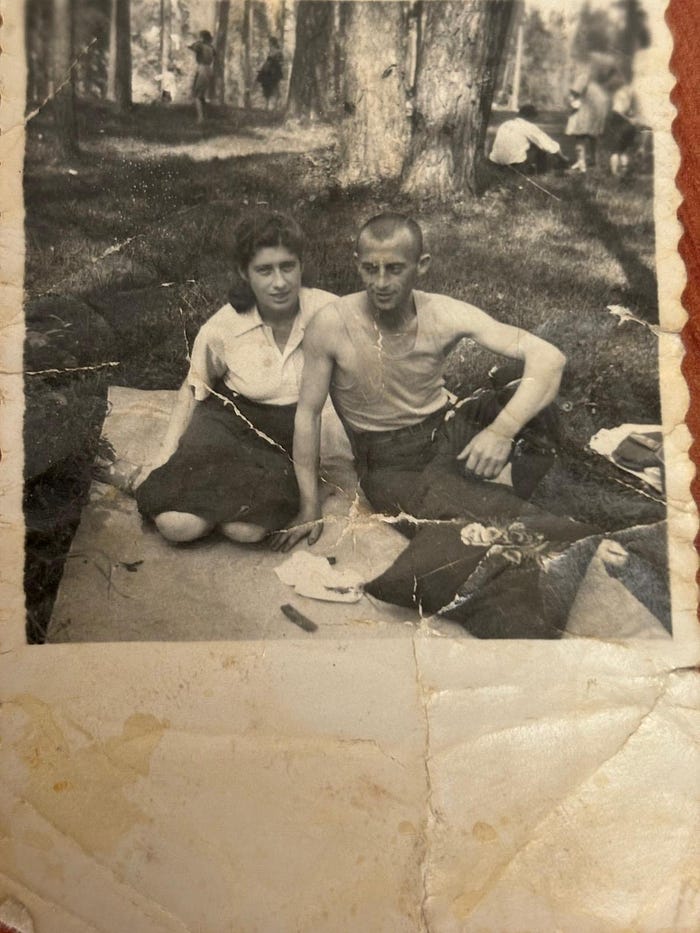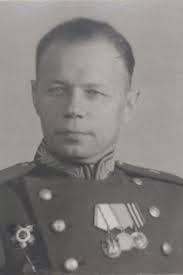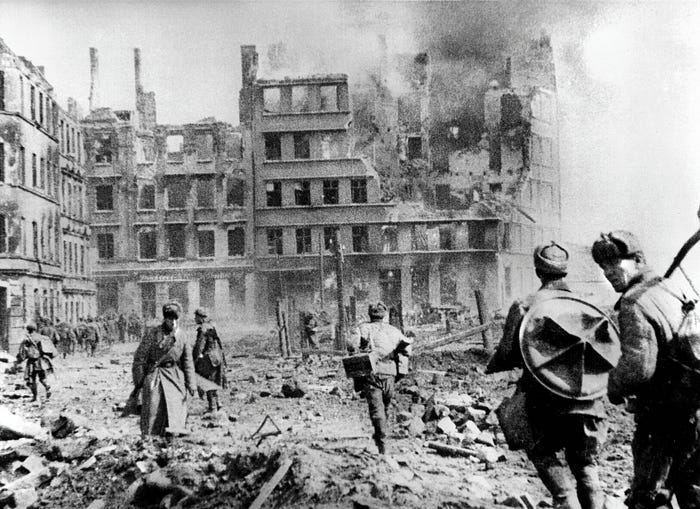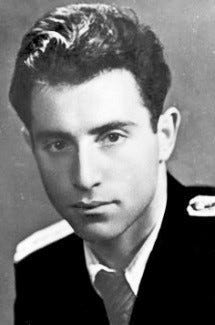This is a guest post by Hanan Kevich.
I thought this was a fascinating tale of Jewish people living in Russia which I know very little about. My own experience involves dark tales of persecution and visa restrictions during the cold war as told by my secondary school teachers and one guest speaker who managed to escape under a cloak of darkness.
Guest posts in the future will remain free to view. All my posts will now be for paid subscribers ONLY…yeah…I can hear the thousands cheering as the six paid subs wonder what they’ve signed up for!
The Story Of Hundreds Of Thousand Jewish Soldiers In The Red Army by Hanan Kevich
In many ways, my late grandfather, Mikhail Mogilevsky, is the life of the average Soviet Jew in the twentieth century. Early years were spent growing up as a child in the Stalin regime's repressive years, through the harsh pre-war reality, the brutal years of WW2, and the post-war era of hardships.
Like hundreds of thousands of Soviet (and Polish) Jews, he fought on the front lines, was wounded multiple times, and was lucky enough to survive the war, get married, and raise a family.
This is his personal story but it is also the story of so many other men and women who fought, treated wounded, ran the logistics of a massive army, bled in the fields, and rotted away in the Nazi POW camps.
Life Of One Jew in the Soviet Union
Mikhail was born in 1925 in Tobolsk, Siberia to Moses and Musa Mogilevsky. He had an older brother, Simon, and a younger sister Sofia. His father was murdered in one of the Stalin purges in the mid-1930s and my grandfather, as the son of the “enemy of the state” was sent to an orphanage at the tender age of 8. He would frequently run away because schools for orphans and children of the “enemy of the state” were abusive, poorly provided, and starved the children. He found a place to stay with a local Jewish tailor and learned the trade’s secret. He worked for food as a tailor’s apprentice for a few years.
At 14, he found work in a poisonous phosphorus mine in the Soviet Arctic Circle, along with his cousin Leo doing twelve-hour shifts of backbreaking work. The temperatures outside ranged from -40° in winter to 40° Celsius in summer. During the summer the mosquitoes were the size of a fist. It didn’t take long for both men to be accused of illegally peddling “bread cards” (a certificate allowing the holder to purchase bread in the late 1930s and 1940s) and Leo was sentenced to Soviet prison.
Side note: Leo was sent to the penal battalion at the beginning of WW2. Penal battalions were used to punish offenders in the army. They had a low survival rate, worse than regular battalions’ provision. The rule was that to get out of the penal battalion to a regular battalion, one had to get seriously wounded, “paying with blood for your offense”. Miraculously, Leo survived the war and was discharged as an officer, which is an amazing feat for a convicted criminal in the Soviet Union.
Years Of War
When the Barbarossa operation began (the German invasion of the Soviet Union) he was 16 and a year later he enlisted in the Red Army (1942), using forged documents as he was underaged. Working in a mine meant long hours and constantly starving for necessities like bread. The army was a way to avoid death by starvation or exhaustion.
He was assigned to the Finnish Front, on the Karelian Isthmus. The Finnish frontline was mostly static but it doesn’t mean there were not everyday fighting. Acute starvation was normal. My grandfather suffered from Hemeralopia which is caused by malnutrition.
On a reconnaissance patrol, he saw a Finn soldier and it was a question of who would shoot first.
My grandfather fired and watched the Fin as his guts spilled out onto the snow. The Fin had a lucky shot and wounded my grandfather in the face. He wore this facial scar for the rest of his life. A painful reminder he would tell every time he would get drunk. Grandfather talked with great respect for the Finnish soldiers, of their bravery and hand-to-hand combat capabilities.
He fought in the 1944 summer assault and breakthrough of the Finnish defensive frontline. Later his unit was attached to the 1st Belarusian front storming the German town of Konigsberg (now Russia’s town of Kaliningrad) in the horrific battles against the city’s formidable 19th century fortifications and the huge garrison stationed there.

Later he was thrown into the heavy fighting for the German town Breslau (now Polish Wroclaw). It was a major defensive position for the German Wehrmacht on the Oder River. The fighting was fierce as it was a major road junction on the way to Berlin.
The last battle he fought was the Vienna Offensive towards the end of the war in Europe.
This is where I had to stop and recheck the entire timeline.
It didn’t make any sense. Participating in three major and bloody battles within three months and live to tell? It was all too fantastic to be true. A lot of the soldiers died in their first battle without ever seeing the enemy while he survived three years of horrific war and several bloody assaults.
It was true though. I reinterviewed several family members and it all checked out. Some people are better at surviving than others and he survived the war against the odds.
As the war ended he found himself in Austria.
There were many Soviet and American units in Austria at this time and a lot of chaos. The border was yet to be established (or agreed upon). While celebrating the end of the war, he got drunk off his ass one night and slept till morning. When he woke up, he discovered that his entire unit had defected to the West and disappeared behind American lines. For the rest of his life, he would joke that had he not gotten drunk that night, his life would have been very different.
He was sent to the restoration efforts in Germany where he worked as a sewage facilities maintainer and learned the trade of a plumber.
He was fully demobilized in 1949, received an apartment in St. Petersburg (then Leningrad), and wed his first wife - but it didn’t last long. He abandoned her and moved to Vilnius, Lithuania where he reunited with wartime buddies. This is where he met my late grandmother and they built their life together until 1991 when my grandmother passed away. He died two years later. They were both proud Zionists and were buried in Israel.
Jews in the Red Army
“Jews defended Tashkent”, the capital of Uzbekistan that was hundreds of miles from the nearest frontline, was the standard joke in the Soviet Union during WW2. Thus hinting that Jews were not part of the war effort against the Nazi invasion of the Soviet Union. This claim couldn’t be farther from the truth.
According to estimates, five hundred thousand Jewish men and women served in the Soviet armed forces, many in command roles. The Jews comprised roughly 1.7% of the total army size similar to the percentage of Jews in the general pre-war Soviet population. This number does not include the many Jewish men who were drafted into the popular militia, without any training or war gear, and thrown to repel the invading German forces during the initial stages of the war. The number of these men (like my wife’s great-uncle) is unknown.
An important factor of the Jewish soldier was his relatively high education in the poorly educated, rural majority army. This contributed to the relatively high number of Jewish officers, many of whom served in units that required specialized technical, academic, or other knowledge. It is estimated that roughly half of the Jewish soldiers were officers during the final stages of the war. Higher than average education meant that many Jewish officers served in the role of political commissar, an officer in charge of political education and indoctrination of the soldiers and making sure that the unit (battalion level and above) ran according to “the established party policy”. As a general rule, the political commissar was a hated figure in the army, compounding the anti-Semitic feelings of other soldiers and officers.
Admittedly, the Red Army during WW2 did not suffer from anti-Semitism too much and was a much more pluralist environment than the Tsar army of the 19th century or during WW1. A good officer could climb the army ladder and uplift oneself in Soviet society through army service during pre-war and war years (like my wife’s grandfather who reached the rank of captain). Many received the rank of Colonel and some even Brig. General and Maj. General ranks.

Some units had an extremely high percentage of Jewish soldiers. Two prominent examples are the 16th Lithuanian Division with ~33% Jewish soldiers (including my late great uncle Jacob) and the 201st Latvian Division with ~17% Jewish soldiers. In these divisions the battle orders were often announced in Russian, Lithuanian, or Latvian respectively, and in Yiddish languages.
Jewish women were also mobilized in the many thousands, serving as communication specialists, managed logistic operations, train conductors and truck drivers, and ran and staffed hospitals. Thousand of nurses, doctors, and pharmacists (as my wife’s late grandmother) as well as part of tank crews, artillery crews, and fighter pilots.

Jews were the minority with the fourth highest number of decorated “Hero of the Soviet Union” distinctions.
Starting with 1942 the “all atheist state” decided that some religious zeal could be useful in the war effort and allowed not only priests but also rabbis, and Jewish religious services. However, maintaining the Jewish way of life like observing Shabbat and eating Kosher was never an option. Soviet Jewish diaspora was on the way to secularization in the pre-war era and the war completed this progress.
There is no official number of dead Jewish soldiers in the Red Army. Best estimates put this figure at two hundred thousand dead, roughly a quarter of them perished in the German POW camps which was a death sentence for the Jewish soldier.
For more articles by Jewish authors, subscribe to the JPF on Medium (click on the image below).
Want even more Jewish bang for your buck? The JPF recommends subscribing to Maccabee Nation by Jason Crystal.












My Grandfather Yuri Kheiker was a tank engineer and went from Finland to Stalingrad to Berlin . He had numerous medals and commendations for Heroism in the most brutal battles .
After the war he was instrumental in the development and was a head of Division 6 of the Minsk tractor plant . It was secret military production portion of the otherwise tractor manufacturing facility .
He was a wonderful man.
His wife, Asya was a war doctor , and they met and got married in Berlin right after the fall of Nazi Germany .
Excellent article, thanks. I would also mention the 20,000 to 30,000 Jewish partisans who fought against the Nazis in the Soviet Union.